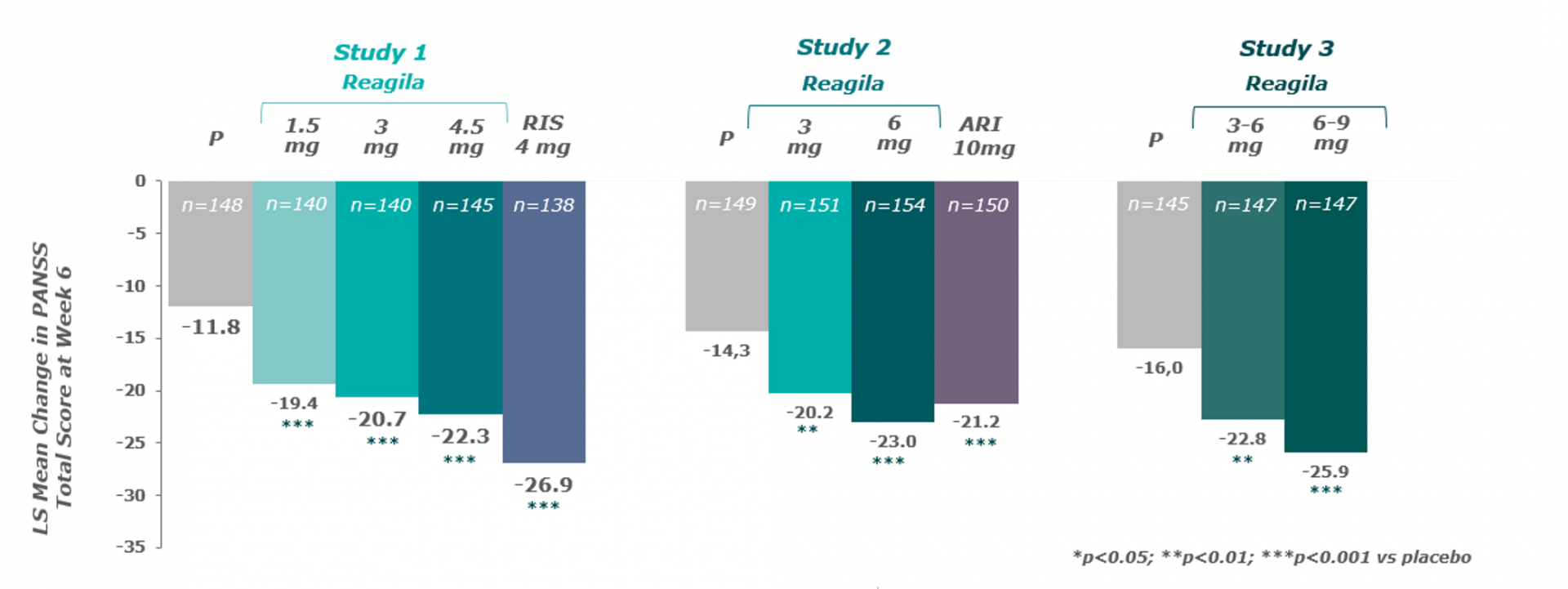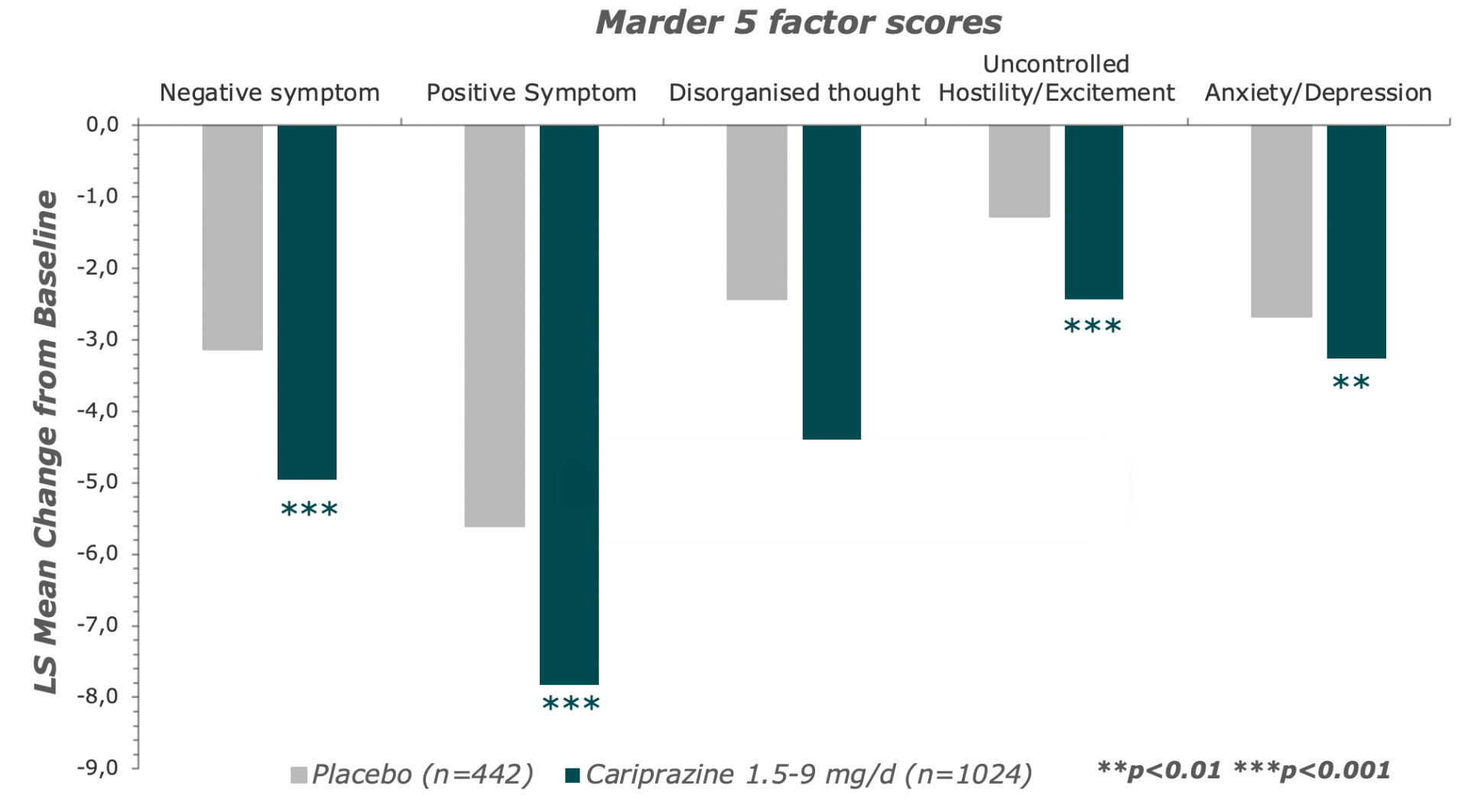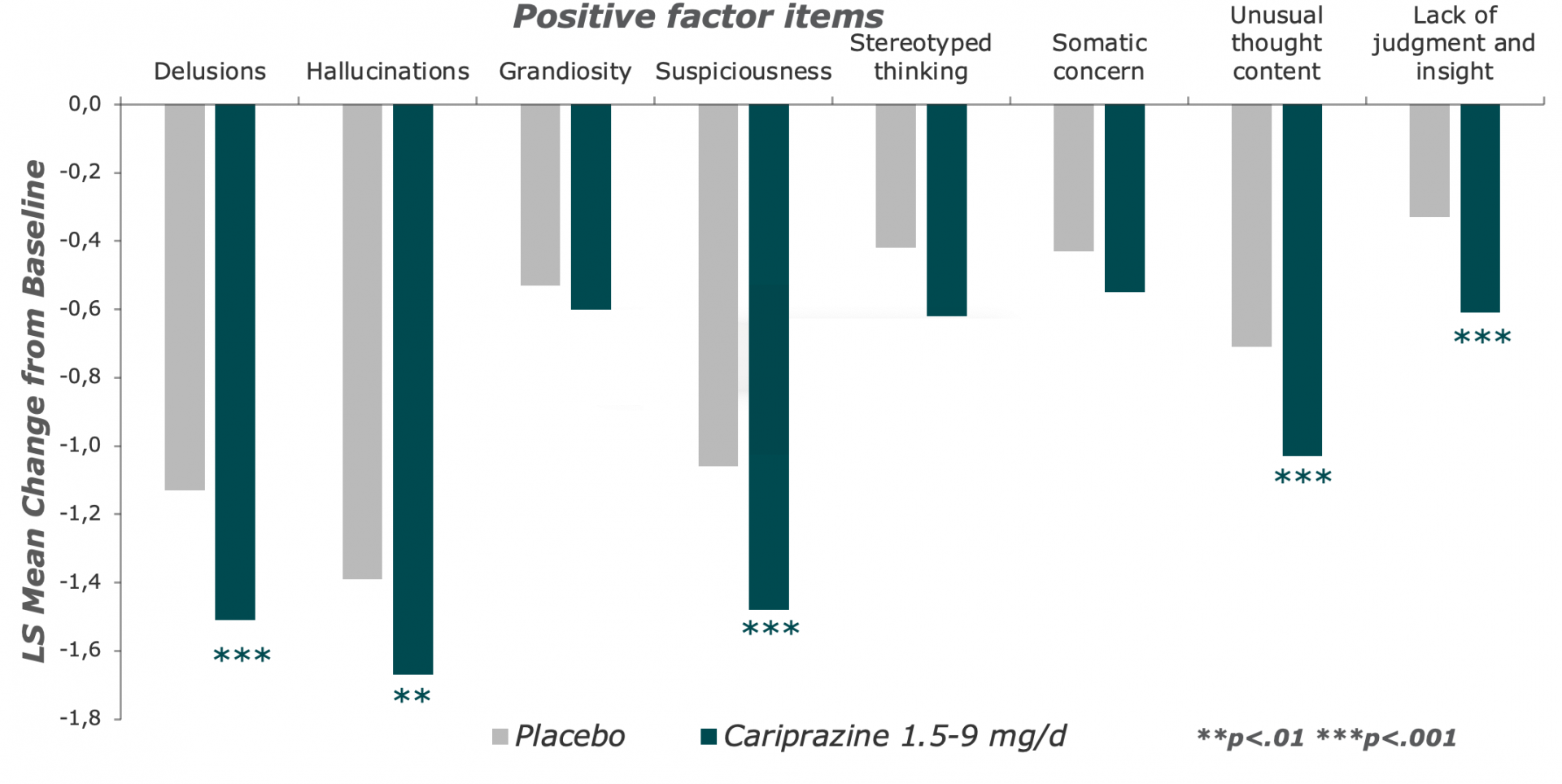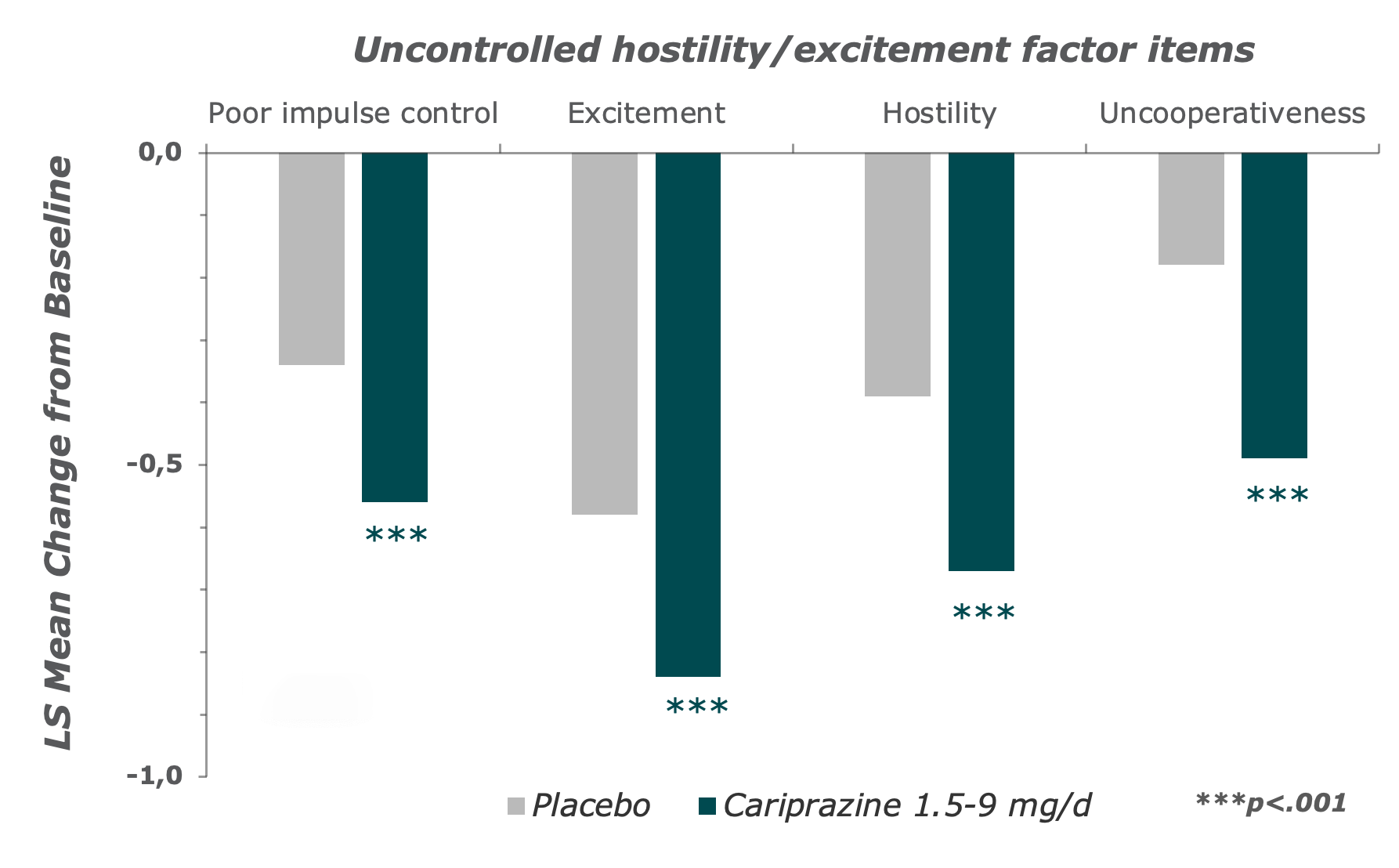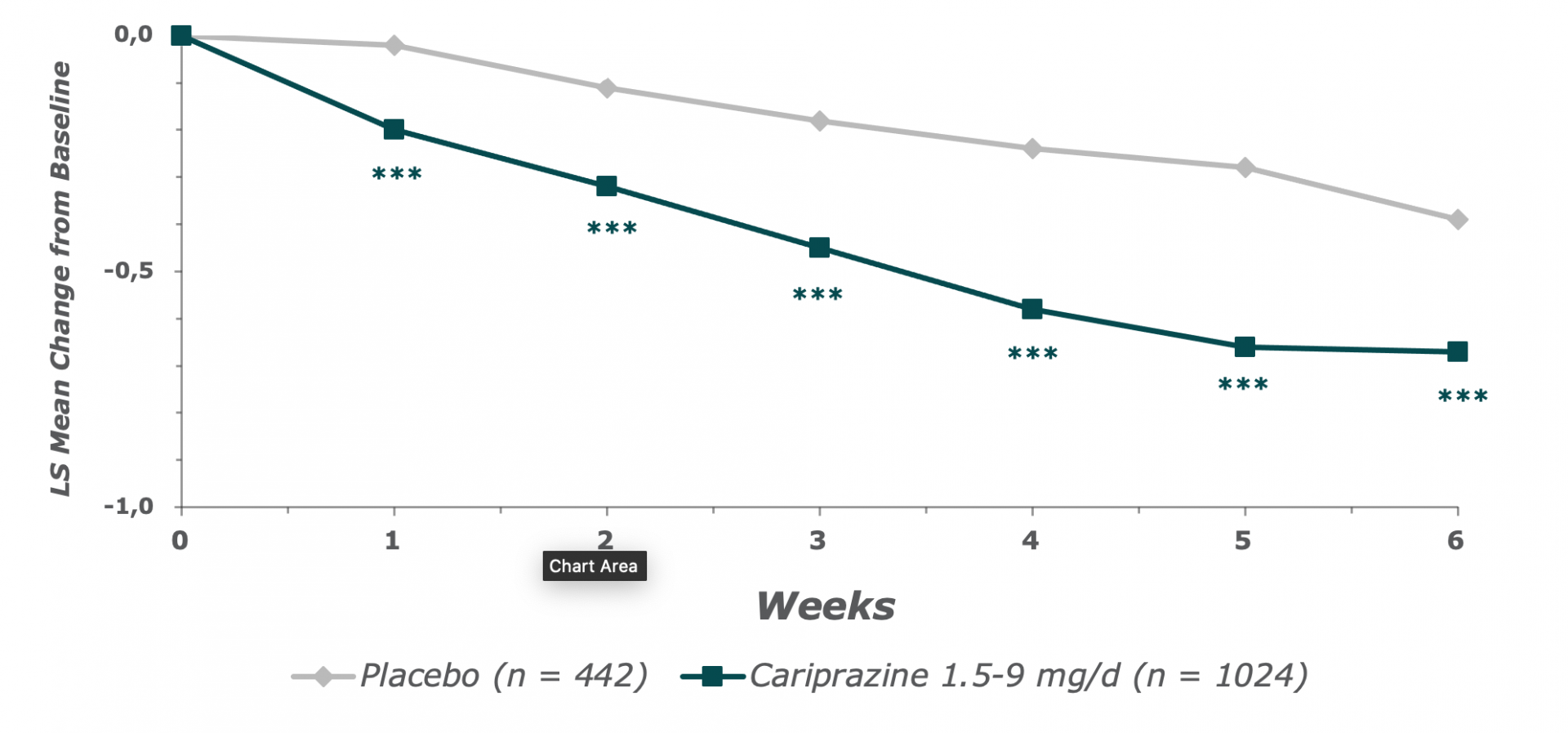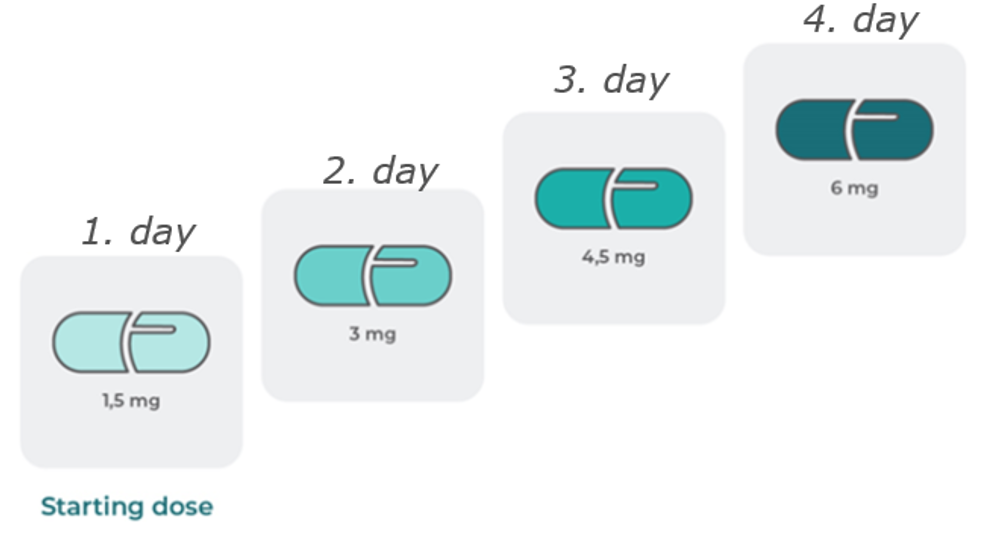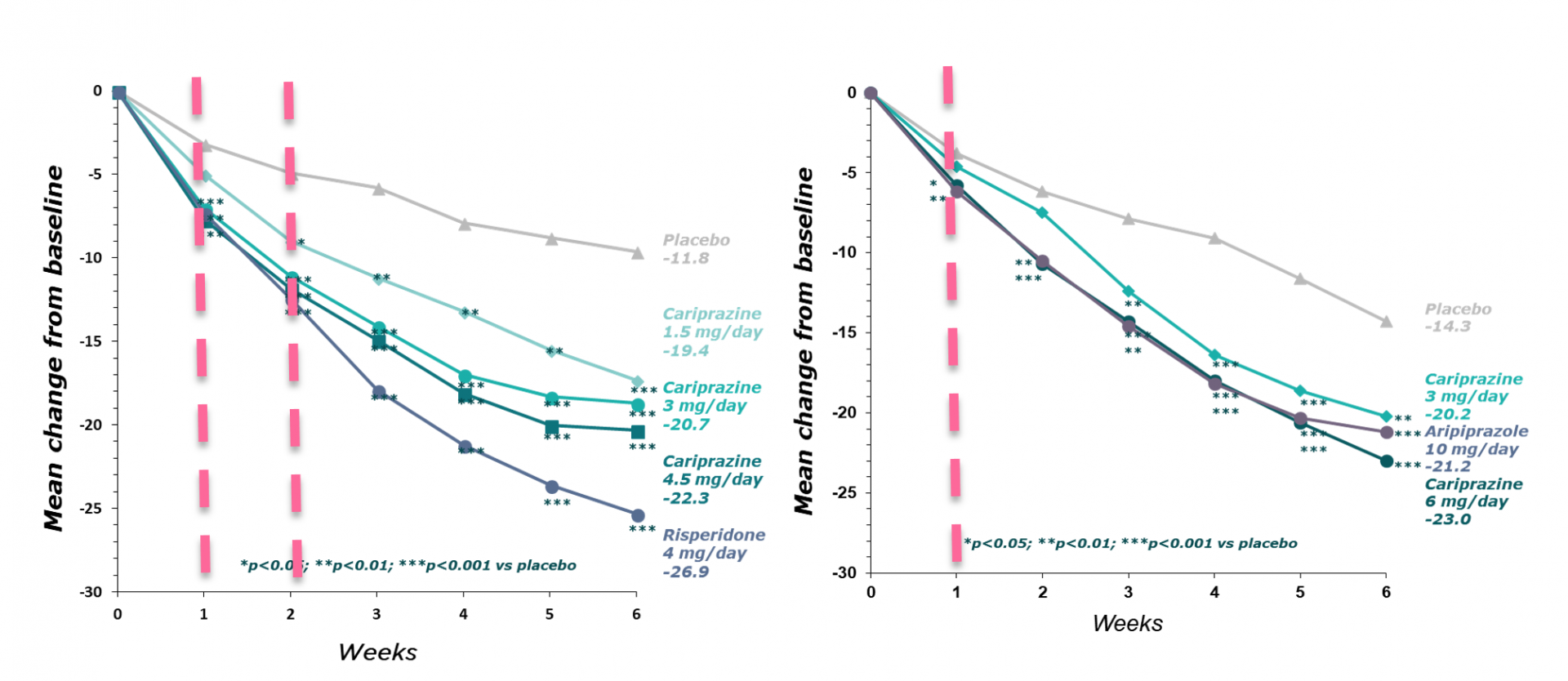
Serii de pacienți: Pacientul acut
In this section
Characteristics
Acute patients are schizophrenia patients who are markedly or severely ill (PANSS total score ≥ 80 and ≤ 120) and are experiencing either their first episode of psychosis or a psychotic relapse.1 They are potentially agitated, irritable or even hostile2 and have a high suicide risk, especially during their first psychotic episode.3 They have prominent positive symptoms, but negative, cognitive and mood symptoms are also present.4 Due to pervasive and severe positive symptoms, patients are often distressed, have difficulty keeping a job and have relationship disruptions.4 Due to patients’ potential inability to function independently4, or to the potential risks to self or others, they may require hospital care.2 Patients often have impaired insight into their condition.2 In the acute phase, patients are prone to abuse of illegal substances, such as cannabis, alcohol or stimulants that could worsen their psychotic symptoms.2
Clinical management
In this patient group, the primary aim is to rapidly resolve the psychotic symptoms with antipsychotic medication.5 Since oral antipsychotics are less invasive and more acceptable to patients, they are offered first.4 If the patient is resistant to or is unable to take the medication, intramuscular injection might be warranted.4 When choosing the antipsychotic, long-term effects need to be considered, as patients usually continue taking the antipsychotic as maintenance therapy.4 Also, in case of relapse, when choosing and antipsychotic, it is necessary to analyse whether it is due to poor compliance with medication: if previous medication was not well-tolerated by the patient, a different antipsychotic should be considered.2 In case of agitation, benzodiazepines are needed as a concurrent treatment.2
Further clinical management of this patient population includes ensuring the safety of both patients and caregivers4, evaluating and treating precipitating factors, such as substance abuse6, and reducing hospitalisation rates.7 In acute patients, the transition to maintenance treatment begins4 with the aim of long-term remission with high functionality, where negative symptoms start to be treated as well.5
During the transition to maintenance, patients and their family should be provided with psychoeducation on the illness and its management.7 Interventions should also aim to improve patients’ social skills, self-care and mood.7 Overall, these interventions should help prevent relapse, reduce hospitalisation rates and facilitate long-term remission with high functionality.7
Cariprazine’s place in the treatment of acute patients
Cariprazine is a D3/D2 partial agonist that has been approved by the European Medicines Agency for the treatment of schizophrenia in adult patients.8 This approval was based on cariprazine’s efficacy in the treatment of acute schizophrenia patients, maintaining remission and preventing relapse.8
In the three studies performed on acute patients with schizophrenia, cariprazine was seen to decrease the PANSS total score at week 6 to a significantly greater degree than placebo.9,10,11
Adapted from: Study 1: Durgam, S. et al. An evaluation of the safety and efficacy of cariprazine in patients with acute exacerbation of schizophrenia: A phase II, randomized clinical trial. Schizophr. Res. 152, 450–457 (2014); Study 2: Durgam, S. et al. Cariprazine in acute exacerbation of schizophrenia: A fixed-dose, phase 3, randomized, double-blind, placebo- and active-controlled trial. J. Clin. Psychiatry 76, e1574–e1582 (2015); Study 3: Kane, J. M. et al. Efficacy and Safety of Cariprazine in Acute Exacerbation of Schizophrenia: Results from an International, Phase III Clinical Trial. J. Clin. Psychopharmacol. 35, 367–373 (2015).
As the predominant symptom complex in acute patients is positive symptoms, this domain was observed separately at week 6: cariprazine yielded significantly greater reductions than placebo on the PANSS positive subscale.9,10,11
Adapted from: Study 1: Durgam, S. et al. An evaluation of the safety and efficacy of cariprazine in patients with acute exacerbation of schizophrenia: A phase II, randomized clinical trial. Schizophr. Res. 152, 450–457 (2014); Study 2: Durgam, S. et al. Cariprazine in acute exacerbation of schizophrenia: A fixed-dose, phase 3, randomized, double-blind, placebo- and active-controlled trial. J. Clin. Psychiatry 76, e1574–e1582 (2015); Study 3: Kane, J. M. et al. Efficacy and Safety of Cariprazine in Acute Exacerbation of Schizophrenia: Results from an International, Phase III Clinical Trial. J. Clin. Psychopharmacol. 35, 367–373 (2015).
Cariprazine is effective in reducing symptoms of all 5 schizophrenia domains (negative, positive, disorganised thought, uncontrolled hostility/excitement, anxiety/depression) in acute patients compared to placebo.12
Adapted from: Marder, S. et al. Efficacy of cariprazine across symptom domains in patients with acute exacerbation of schizophrenia: Pooled analyses from 3 phase II/III studies. Eur. Neuropsychopharmacol. 29, 127–136 (2019).
Cariprazine was effective in significantly reducing the overall positive symptom domain in acute patients compared to placebo: this effect was driven by 6 of 8 subdomains.12
Adapted from: Marder, S. et al. Efficacy of cariprazine across symptom domains in patients with acute exacerbation of schizophrenia: Pooled analyses from 3 phase II/III studies. Eur. Neuropsychopharmacol. 29, 127–136 (2019).
Cariprazine significantly decreased overall hostility symptoms in acute patients compared to placebo: this effect is driven by all subdomains.12
Adapted from: Marder, S. et al. Efficacy of cariprazine across symptom domains in patients with acute exacerbation of schizophrenia: Pooled analyses from 3 phase II/III studies. Eur. Neuropsychopharmacol. 29, 127–136 (2019).
Compared to placebo, cariprazine produced highly significant immediate reductions in hostility and this effect was maintained over the course of the 6-week treatment.13
Adapted from: Citrome, L., Durgam, S., Lu, K., Ferguson, P. & Laszlovszky, I. The effect of cariprazine on hostility associated with schizophrenia. J. Clin. Psychiatry 77, 109–115 (2016).
Dosing
In acute patients, fast up-titration of cariprazine by 1.5 mg increments/day is indicated for achieving rapid symptom control, starting from 1.5 mg/day and increasing to 6 mg/day; all doses were effective and well tolerated.9,10,11 The starting dose of cariprazine is 1.5 mg and can be increased daily.
Adapted from: Study 1: Durgam, S. et al. An evaluation of the safety and efficacy of cariprazine in patients with acute exacerbation of schizophrenia: A phase II, randomized clinical trial. Schizophr. Res. 152, 450–457 (2014); Study 2: Durgam, S. et al. Cariprazine in acute exacerbation of schizophrenia: A fixed-dose, phase 3, randomized, double-blind, placebo- and active-controlled trial. J. Clin. Psychiatry 76, e1574–e1582 (2015); Study 3: Kane, J. M. et al. Efficacy and Safety of Cariprazine in Acute Exacerbation of Schizophrenia: Results from an International, Phase III Clinical Trial. J. Clin. Psychopharmacol. 35, 367–373 (2015).
The first effects are expected to be seen after a few days, and the effects become statistically significant after 7 days (statistically significant effects in acute patients were seen after 1 week for 3 mg, 4.5 mg and 6 mg doses and after 2 weeks for 1.5 mg). 9,10
Adapted from: Durgam, S. et al. An evaluation of the safety and efficacy of cariprazine in patients with acute exacerbation of schizophrenia: A phase II, randomized clinical trial. Schizophr. Res. 152, 450–457 (2014); Durgam, S. et al. Cariprazine in acute exacerbation of schizophrenia: A fixed-dose, phase 3, randomized, double-blind, placebo- and active-controlled trial. J. Clin. Psychiatry 76, e1574–e1582 (2015).
Steady-state conditions are achieved after 3-4 weeks of treatment, so the full effects of each dose are seen within this time-frame.14
Note: The recommended starting dose is 1.5 mg once a day. The dose can be increased by 1.5 mg at a time up to a maximum of 6 mg per day.
COD. 300021/R55. Submitted to AIFA on 29/11/2021
References
- Leucht, S. et al. What does the PANSS mean? Schizophr. Res. 79, 231–238 (2005).
- Keks, N. The Acutely Psychotic Patient. Handb. Emerg. Psychiatry 35, 198–213 (2006).
- Palmer, B. A., Pankratz, V. S. & Bostwick, J. M. The lifetime risk of suicide in schizophrenia: A reexamination. Arch. Gen. Psychiatry 62, 247–253 (2005).
- Jibson, M. Pharmacotherapy of acute schizophrenia. Psychiatr. Times 24, (2007).
- de Bartolomeis, A., Fagiolini, A., Vaggi, M. & Vampini, C. Targets, attitudes, and goals of psychiatrists treating patients with schizophrenia: Key outcome drivers, role of quality of life, and place of long-acting antipsychotics. Neuropsychiatr. Dis. Treat. 12, 99–108 (2016).
- Lieberman, J. A. et al. The early stages of schizophrenia: Speculations on pathogenesis, pathophysiology, and therapeutic approaches. Biol. Psychiatry 50, 884–897 (2001).
- Patel, K. R., Cherian, J., Gohil, K. & Atkinson, D. Schizophrenia: Overview and treatment options. P T 39, 638–645 (2014).
- Reagila Summary of Product Characteristics. doi:10.1163/187103210×528192.
- Durgam, S. et al. An evaluation of the safety and efficacy of cariprazine in patients with acute exacerbation of schizophrenia: A phase II, randomized clinical trial. Schizophr. Res. 152, 450–457 (2014).
- Durgam, S. et al. Cariprazine in acute exacerbation of schizophrenia: A fixed-dose, phase 3, randomized, double-blind, placebo- and active-controlled trial. J. Clin. Psychiatry 76, e1574–e1582 (2015).
- Kane, J. M. et al. Efficacy and Safety of Cariprazine in Acute Exacerbation of Schizophrenia: Results from an International, Phase III Clinical Trial. J. Clin. Psychopharmacol. 35, 367–373 (2015).
- Marder, S. et al. Efficacy of cariprazine across symptom domains in patients with acute exacerbation of schizophrenia: Pooled analyses from 3 phase II/III studies. Eur. Neuropsychopharmacol. 29, 127–136 (2019).
- Citrome, L., Durgam, S., Lu, K., Ferguson, P. & Laszlovszky, I. The effect of cariprazine on hostility associated with schizophrenia. J. Clin. Psychiatry 77, 109–115 (2016).
- Nakamura, T. et al. Clinical pharmacology study of cariprazine (MP-214) in patients with schizophrenia (12-week treatment). Drug Des. Devel. Ther. 10, 327–338 (2016).
[dc-hide-content]CARIPRAZINE ADD-ON: ANOTHER CASE[/dc-hide-content]CARIPRAZINE ADD-ON: ANOTHER CASE
[dc-hide-content](COD. 300020/R43. Submitted to AIFA on 12 October 2020). This article by De Berardis et al. presents a case of schizophrenia successfully treated with cariprazi[/dc-hide-content]This article by De Berardis et al. presents a case of schizophrenia successfully treated with our product as an add-on therapy in inadequate clozapine response.
continuă…[dc-hide-content]REDISCOVER JOY IN EVERYDAY LIFE[/dc-hide-content]REDISCOVER JOY IN EVERYDAY LIFE
[dc-hide-content](COD. 300021/R54. Submitted to AIFA on xx/xx/xxxx). This case report by Kurimay and Arányi presents a female single mom patient whose life was turned around aft[/dc-hide-content]This case report by Kurimay and Arányi presents a female single mom patient whose life was turned around after being treated for schizophrenia negative symptoms
continuă…
